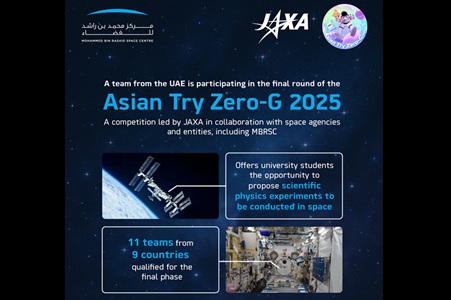UAEU Students to Study Microgravity Harmonic Motion in Space

A team of six UAEU students is set to delve into the realm of harmonic motion and damping in microgravity to enhance the understanding of physical behaviors in space compared to those on Earth. The Mohammed Bin Rashid Space Centre (MBRSC) revealed that a group from the United Arab Emirates University (UAEU) has been chosen to represent the nation in the final phase of the Asian Try Zero-G 2025 competition. This collaborative event involves the Japan Aerospace Exploration Agency (JAXA) and various other space organizations.
The competition provides university students from the Asia-Pacific region with the platform to propose physics experiments to be carried out on the International Space Station (ISS). The experiments will be conducted by a Japanese astronaut inside the Japanese Experiment Module “Kibo”. Out of the 11 teams from nine countries that have qualified for the final stage, the actual experiments are expected to take place between the second half of 2025 and the beginning of 2026.
This year’s edition saw MBRSC receive 17 experiment proposals from 74 students representing eight universities in the UAE. Following stringent internal evaluations, the Centre selected three teams, among them the UAEU’s proposal that has now advanced to the final round.
The research initiative by the six UAEU students concentrates on exploring the effects of harmonic motion and damping in microgravity, seeking to offer insights into the physical behaviors in space amid a gravitational environment different from Earth’s.
MBRSC’s backing of student engagement in the Asian Try Zero-G venture aligns with its broader dedication to science education, community involvement, and partnerships with academic institutions nationwide. Through such endeavors, the Centre is committed to providing aspiring young talents with meaningful prospects to partake in authentic research and acquire practical experience in the field of space science.




